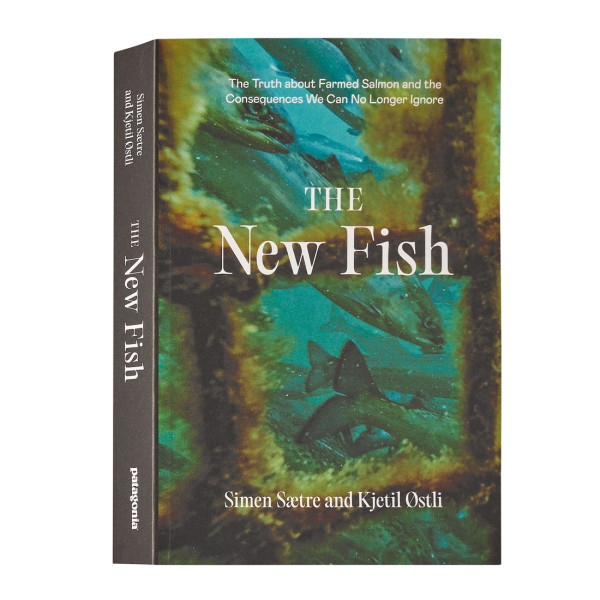Doctors say one should eat more fish. But is the salmon that ends up on our table really healthy? These and many other questions are addressed in 'The New Fish: The Truth about Farmed Salmon and the Consequences We Can No Longer Ignore' by Simen Sætre and Kjetil Østli. A fantastic book for anyone who wants to learn about the impact of salmon farming in open net pens on our environment. Published by Patagonia.
About the Book:
In the early 1970s, a group of scientists explored ways to produce more food for the growing world population. Looking to the sea, they extracted genes from salmon from 41 Norwegian and Swedish rivers and developed a new salmon that grows larger and faster. This was seen as an amazing innovation and marked the beginning of a new industry: salmon farming. This form of salmon farming spread along the Norwegian coast to Scotland, Canada, Australia, Ireland, Chile, Iceland, the Faroe Islands, and the USA. The business boomed, jobs were created, and a new type of food, farmed salmon, spread around the globe. Everywhere, people bought and enjoyed the abundant fish: grilled, poached, fried, as sushi, and sashimi. They were grateful for this delicious, affordable source of protein. But at what cost?
Today, we know there were unintended consequences: Some of these new fish escaped and competed with other fish in the sea. The new fish spread diseases, salmon lice multiplied rapidly, and wild salmon stocks declined.
In an award-winning five-year study, authors Simen Sætre and Kjetil Østli have extensively examined Norway's role in the global salmon industry and for the first time presented a comprehensive assessment of the harmful effects of salmon farming. The results are not promising: from parasites to escaped salmon, from waste concentration in the farming facilities in the fjords through which the wild salmon swim to their birth rivers, to the fact that salmon farming leads to a net reduction of protein extracted from the sea. Recent successes, like the banning of fish farms in the waters of Washington state, are indicative of our growing awareness of the ecological cost of farmed fish. It is said that we will continue to repeat the same mistakes until we understand them. The New Fish combines natural reports from Norwegian fjords, the Canadian coast, Iceland, and the distant south of Chile with concise, literary nonfiction and classic investigative journalism. The authors began with the question: What happens when you create a new animal and settle it in the sea? This book contains the answer.
About the Authors:
Simen Sætre (b. 1974) is an investigative journalist whose texts have been published in many languages. He has written six books, including on the international chocolate industry, oil states, and a spy in the Norwegian army. His thought-provoking books have been highly praised and nominated for awards. Kjetil Østli (b. 1975) is a journalist and author. He is co-editor of the online magazine Harvest, specializing in natural reports. He has received several awards and honors for his reporting and his four books. His debut, Cops and Robbers, won the prestigious Brage Award.
Reviews:
- "A damning indictment of the impacts and injustices caused by a profit-driven aquaculture industry - and a compelling call to protect, regenerate, and preserve the Earth's natural systems." (Joseph Bogaard, Executive Director of the Save Our Wild Salmon Coalition)
- "A chilling report for anyone interested in food, the environment, and the consequences of experimenting with nature." (Robert O'Harrow, author for The Washington Post)
- "A fast-paced and gripping read that you can't put down. And when you're done, it leaves you angry and newly motivated." (Anne Shaffer, PhD, Coastal Watershed Institute)
Details:
- Paperback; 368 pages
- Full color with over 80 photos
- Dimensions: 15 cm x 23 cm
- Published by Patagonia
- Language: English
- Weight: 680 g
Established back in 1973, Patagonia stands for sustainable and functional outdoor clothing. This impressive selection also includes a fantastic range of high-quality wading gear. In addition to reliable waders, wading jackets and wading boots, Patagonia offers a variety of practice-oriented backpacks and packs. As a co-founder of the "One Percent for the Planet" movement, Patagonia has been donating around 1% of its annual revenue to environmental organisations since 2002. By transferring the entire company shares, this inspiring brand set new standards in terms of sustainability. The “Earth is now our only shareholder” represented by the Patagonia Purpose Trust and the non-profit organisation Holdfast Collective. From now on, all profits – except for the money that is reinvested in the company – will be used to fight the environmental crisis and save the planet. In short: The high-quality products from Patagonia are always a great choice for environmentally conscious men and women who love fly fishing!



































